Project
WISDOM: Strengthening the Community’s Voice
-
Amount Funded
199,825 EUROProject Duration
01 Feb 2017 - 31 Jan 2018 -
-
Lead organisation
-
Asia Pacific Coalition on Male Sexual Health (APCOM) was founded in 2007, as a coalition of member-governments, UN partners, non-profits and community-based organisations from Asia and the Pacific. The coalition transformed over the years, which led to its registration as a Thai Foundation in 2014 and a new governance structure in 2016 reflecting its nature as a regional community network organisation.
APCOM represents a diverse range of interests, working together to advocate on, highlight and prioritise HIV issues – including rights, health and well-being – that affect the lives of men who have sex with men (MSM) and transgender people.
-
Organisation
Asia Pacific Coalition on Male Sexual Health (APCOM) was founded in 2007, as a coalition of member-governments, UN partners, non-profits and community-based organisations from Asia and the Pacific. The coalition transformed over the years, which led to its registration as a Thai Foundation in 2014 and a new governance structure in 2016 reflecting its nature as a regional community network organisation.
APCOM represents a diverse range of interests, working together to advocate on, highlight and prioritise HIV issues – including rights, health and well-being – that affect the lives of men who have sex with men (MSM) and transgender people.
-
Project
Asia Pacific Coalition on Male Sexual Health (APCOM) will work with partners in Indonesia, the Philippines, Cambodia and Lao PDR to strengthen the capacity of the most HIV-affected communities and their peer-based organisation to participate in national and regional responses to HIV.
This learning project wants to capture the lessons from their pilot project on capacity strengthening “JumpStar” in 2015/2016. JumpStar has defined success because it enabled APCOM to build expertise in technical support and advocacy as well as build credibility among civil society in Asia and the Pacific. However, capacity strengthening proved a challenge and targets and objectives were missed. Therefore, WISDOM will test whether it would be more effective to have fewer partners (four instead of seven), focus on local advocacy material for bigger local impact and more intensive mentoring to overcome their previous challenges. Looking at the HIV context in Asia there is a strong need to strengthen the capacity and to deepen the learnings of organisations working with sexually diverse people and people with different gender orientations in the four different countries.
-
Learning
- How can we design a better Monitoring and Evaluation Framework for the project that captures the added value for both the advocacy activities of the partners and the capacity strengthening programme that we offer?
- How can we design acceptable variances in the programme to implement the learning from the pilot project and capture the learning from this new programme without compromising the existing package and equal service-level offered to different programme partners? And how can we maximise and measure our impact on a local level?
- How can we transform and strengthen the WISDOM-systematic capacity strengthening project in order to respond to the diversity of the directly participating learners and organisations?”
- How can we work best with implementing project partners to design, implement and evaluate an effective knowledge management and knowledge impact strategy? And how can programme partners learn best from each other given the various cultural contexts and language barriers?
- How can we embed the programme into wider community sustainability frameworks and debates like the SDG framework/2030-Agenda for Sustainable Development/2016 Political Declaration on Ending AIDS?
- How can we embed and implement the learning coming from this programme into our own strategic thinking and programme planning processes to maximise impact?
-
-
Asia Pacific Coalition on Male Sexual Health (APCOM) will work with partners in Indonesia, the Philippines, Cambodia and Lao PDR to strengthen the capacity of the most HIV-affected communities and their peer-based organisation to participate in national and regional responses to HIV.
This learning project wants to capture the lessons from their pilot project on capacity strengthening “JumpStar” in 2015/2016. JumpStar has defined success because it enabled APCOM to build expertise in technical support and advocacy as well as build credibility among civil society in Asia and the Pacific. However, capacity strengthening proved a challenge and targets and objectives were missed. Therefore, WISDOM will test whether it would be more effective to have fewer partners (four instead of seven), focus on local advocacy material for bigger local impact and more intensive mentoring to overcome their previous challenges. Looking at the HIV context in Asia there is a strong need to strengthen the capacity and to deepen the learnings of organisations working with sexually diverse people and people with different gender orientations in the four different countries.
-
- How can we design a better Monitoring and Evaluation Framework for the project that captures the added value for both the advocacy activities of the partners and the capacity strengthening programme that we offer?
- How can we design acceptable variances in the programme to implement the learning from the pilot project and capture the learning from this new programme without compromising the existing package and equal service-level offered to different programme partners? And how can we maximise and measure our impact on a local level?
- How can we transform and strengthen the WISDOM-systematic capacity strengthening project in order to respond to the diversity of the directly participating learners and organisations?”
- How can we work best with implementing project partners to design, implement and evaluate an effective knowledge management and knowledge impact strategy? And how can programme partners learn best from each other given the various cultural contexts and language barriers?
- How can we embed the programme into wider community sustainability frameworks and debates like the SDG framework/2030-Agenda for Sustainable Development/2016 Political Declaration on Ending AIDS?
- How can we embed and implement the learning coming from this programme into our own strategic thinking and programme planning processes to maximise impact?



